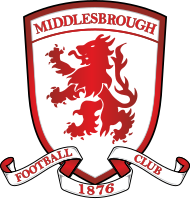 | |||
| Full name | Middlesbrough Football Club | ||
|---|---|---|---|
| Nickname(s) | Boro, The Smoggies | ||
| Short name | MFC, Boro | ||
| Founded | 18 February 1876 | ||
| Ground | Riverside Stadium | ||
| Capacity | 34,742 | ||
| Owner | Steve Gibson | ||
| Chairman | Steve Gibson | ||
| Head coach | Michael Carrick | ||
| League | EFL Championship | ||
| 2023–24 | EFL Championship, 8th of 24 | ||
| Website | Club website | ||
|
| |||
Middlesbrough Football Club (/ˈmɪdəlzbrə/ MID-əlz-brə) is a professional association football club based in Middlesbrough, North Yorkshire, England. They compete in the EFL Championship, the second level of the English football league system. Nicknamed the Boro, they were formed in 1876 and are the 12th oldest football league club in England and Wales. The club have played at the Riverside Stadium since 1995,[1] having previously played at Ayresome Park for 92 years, from 1903 to 1995.
Middlesbrough were one of the founding members of the Premier League in 1992, and have spent all but two seasons of their entire history as a professional club competing within the top two tiers of English football.[2] Their highest league finish to date was third place in the top flight in the 1913–14 season. The outbreak of the First World War stunted their push for a first top division title, though the club pushed again during the inter-war years, finishing fourth in the 1938–39 season before the Second World War halted the English leagues and again prevented a push for a first title. The club came within minutes of folding in 1986 before they were saved by a consortium led by board member and later chairman Steve Gibson.[3] A remarkable recovery saw the club immediately earn back to back promotions to the top division in the 1986-87 and 1987-88 seasons. The club were runners-up in the FA Cup and League Cup in 1997[4][5] while also being relegated following a controversial 3-point deduction,[6] and losing another League Cup final the following season. Under Steve McClaren, the club won the League Cup in 2004, its first major silverware, and reached the 2006 UEFA Cup final. The club has played one Premier League season since relegation in 2009.
Middlesbrough is the only major professional football club in the greater Teesside area (the 14th biggest urban area in England), the Tees Valley, and the county of North Yorkshire (the largest county in England by land mass[7]). The club has regional rivalries with the two closest major clubs, Newcastle United (the Tyne–Tees derby) and Sunderland (the Tees–Wear derby).[8]
The club's traditional kit is red with white detailing, often in the form of a white chest band. The home shorts and sock colours have interchangeably been shifted between red and white, complementing the red shirt that was adopted in 1899.[9] The various crests throughout the club's history, the most recent of which was adopted in 2007,[10] incorporate a lion rampant.
- ^ "Boro FC club info". gazettelive.co.uk. Archived from the original on 4 September 2007. Retrieved 27 May 2008.
- ^ Cite error: The named reference
MFCHistBk1was invoked but never defined (see the help page). - ^ Cite error: The named reference
PremierLeagueSitewas invoked but never defined (see the help page). - ^ Stewart, Rob (30 January 2017). "Middlesbrough 1996/97: rucks, relegation, cup finals... and training at a prison". FourFourTwo. Retrieved 5 September 2022.
- ^ Vickers, Anthony (6 April 2020). "Middlesbrough's surreal draining 'Dream Time' 96/97 season still shapes fans' emotions". TeessideLive. Retrieved 5 September 2022.
- ^ Duxbury, Nick (15 January 1997). "Middlesbrough rocked by three-point penalty". Independent. Retrieved 23 February 2024.
- ^ "English Counties By Population And Area 2024". populationdata.org. 27 August 2021. Retrieved 22 March 2024.
- ^ "Club rivalries uncovered" (PDF). footballfancensus. Archived from the original (PDF) on 20 October 2013. Retrieved 13 October 2007.
- ^ "Middlesbrough historical kits". Historicalkits.co.uk. Retrieved 12 June 2019.
- ^ Westcott, Matt (12 May 2007). "Boro change badge to reflect history". The Northern Echo. Archived from the original on 7 December 2008. Retrieved 10 October 2008.